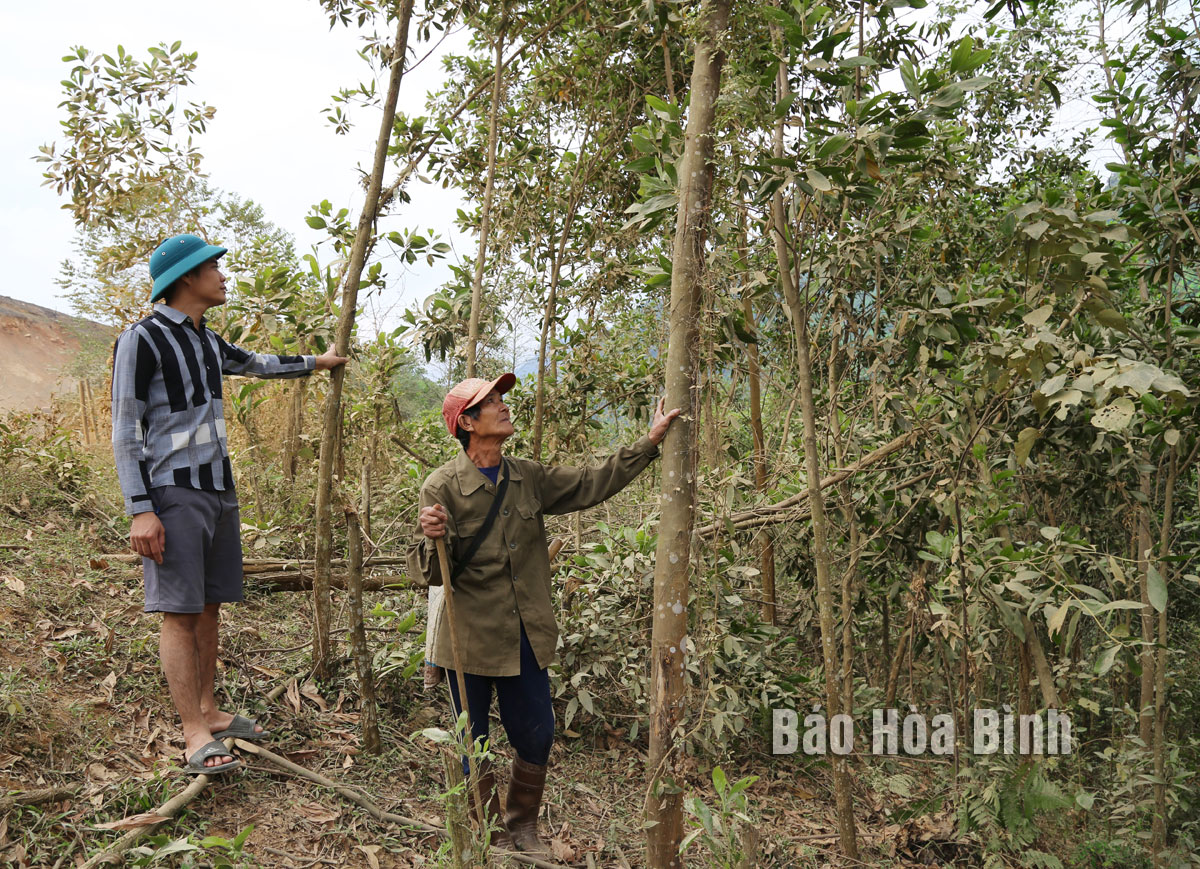
In recent years, ethnic minority households in the province have embraced forestry and livestock farming as key drivers of income generation. By harnessing the economic potential of forests, these communities have not only improved their livelihoods but also contributed to sustainable development.
Residents in Rang hamlet, Cao Son commune, Da Bac district raise their income thanks to afforestation.
Rang hamlet, located in Cao Son commune, Da Bac district, is home to the Dao and Muong ethnic groups. Nestled in a picturesque valley by the Rang Stream and surrounded by lush hills of acacia and Bodhi trees, the village boasts over 200 hectares of production forest. For generations, locals' livelihoods have been intricately tied to the forest.
Dinh Van Son, a resident of Xom Rang, manages over three hectares of forest, primarily acacia. Before the forest was allocated to them, it was covered with bamboo and shrubs, Son recalled. Since receiving the land, they’ve planted multiple cycles of acacia, each generating an income of over 100 million VND (approximately 3,928 USD) after five years.
In addition to acacia cultivation, Son raises buffaloes, grazing them on the hills during the day and sheltering them in the barn at night. "Forestry has provided us with a stable income,” he added.
Similarly, Luong Van Hau, also in Rang hamlet, has secured his family’s financial stability through forestry. With over three hectares of land, his family initially planted acacia on a short 4–5-year cycle. Recently, he extended the cycle to seven years to enhance profitability.
"Acacia cultivation doesn’t require significant investment,” Hau explained. "Each hectare yields about 70 million VND. During the waiting period, we supplement our income by raising livestock and harvesting branches for firewood.”
According to Ngo Van Cuong, Secretary of the Party Secretary of Cao Son commune, residents in other villages are also expanding forestry activities, focusing on planting large timber trees for greater economic returns. "There is a local facility for purchasing and processing raw wood, making it convenient for people to develop forestry-based economies,” Cuong noted.
In Thach Yen commune, Cao Phong district, many households are combining forestry with livestock farming, yielding stable incomes. One such example is Bui Van Chien’s family in Bo hamlet, who earn over 100 million VND annually by raising 10 buffaloes and cows and cultivating three hectares of acacia forest.
Since the beginning of the year, over 8,340 hectares of forests have been planted, equal to 150% of the province’s target, alongside 947,000 scattered trees. With a forest coverage rate exceeding 51.6%, these forests are regarded as the province’s vital "green lungs.”
To further support sustainable forestry development, provincial authorities have implemented various policies, including initiatives to protect forests and alleviate poverty among ethnic minority communities during 2015–2020. Currently, the Hoa Binh forest protection and development project is underway, with a total investment exceeding 127 billion VND.
Hoa Binh province’s economy posted an impressive Gross Regional Domestic Product (GRDP) growth rate of 12.67% in the first quarter of 2025, representing a 12.76% year-on-year increase, the highest rate recorded since the beginning of the current tenure, according to the provincial Statistics Office. This robust growth reflects years of strategic groundwork and sets a strong foundation for the province’s annual growth target of over 10%.
With a focus on cash crop farming with science - technology application and brand building, Lac Thuy district is gradually increasing production value, improving people's life quality, and laying the foundation for sustainable socio-economic development.
In recent years, the economic development model "Hoa Binh Earthworm Farm” run by Mr. Bui Van Dang in Co Giua Hamlet, My Thanh Commune (Lac Son district) has not only brought stable economic value but it is also environmentally friendly, helping to protect and reduce pollution, contributing to the construction of a green and sustainable agriculture.
Dao Village’s honey – a product certified with a 3-star OCOP (One Commune One Product) rating by Thong Nhat Agricultural Cooperative in Dao Village (Hoa Binh City) – is highly regarded by consumers for its quality, richness, and variety in packaging. The distinctively sweet taste of Dao Village’s honey leaves a lasting impression on anyone who has tried it.
In alignment with Project No. 07-DA/TU, issued by the Hoa Binh provincial Party Committee on November 1, 2021, Lac Thuy district has actively promoted investment and supported the sustainable development of its industrial and handicraft sectors during the 2021–2025 period. Alongside this, the district has remained committed to preserving and revitalising traditional craft villages.
Located in the northern part of Lac Thuy district, with a temperate climate and fertile soil, Phu Thanh commune has great potential and advantages in growing tea. The long-standing experience, combined with strict adherence to organic farming practices in the tea gardens, ensures that the dried tea products from Phu Thanh and Lac Thuy as a whole are sold out immediately upon production, providing a stable and prosperous life for the local people.



